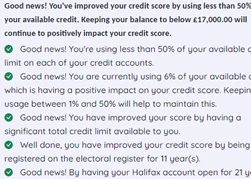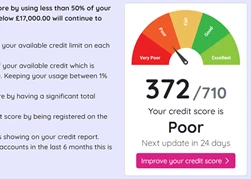Identity Theft Warning Signs

11th Apr 2025
Online identity theft is a growing concern for many people living in the UK, as cyber criminals continue to refine their techniques for stealing personal information. Identity theft can be annoying and inconvenient, but it can also seriously damage your credit score if the fraudsters manage to take out new credit agreements using your personal details. Identity theft appears to be on the rise, with British authorities recording a 4% increase in 2024 compared with 2023. There are however some key things to look out for if you are concerned about the potential for identity theft.
Unexpected Changes to Your Credit Report
If you see new accounts or credit inquiries you didn’t make when you look at your credit report, this could be a strong indicator of identity theft. Regularly checking your credit score and report helps catch suspicious activity early. This is free to do and worth doing at least monthly.
Receiving Bills for Unopened Accounts
If you start receiving bills, statements, or invoices for accounts you don’t recognise, it may mean someone has fraudulently opened an account in your name. Never ignore this sort of mail; contact the companies directly, and if money has already been spent, lodge a report with Action Fraud. Similarly, if you don’t get mail which you are expecting, or suddenly stop getting statements or bills, this could also be an indicator that something strange is going on.
Unusual Bank Statement Activity
Reviewing your bank statements regularly is essential, and it’s easy to keep an eye on activity on your account if you manage it online. Be on the lookout for:
- Unexplained withdrawals or charges
- Transactions in unfamiliar locations
- Purchases you didn’t make
These could indicate someone has gained unauthorised access to your bank account or credit card.
Unexpected Password Change Notifications
Emails or text notifications about password changes or account updates you didn’t request could mean someone is accessing your online accounts. This is especially concerning with accounts tied to email or finances. Never ignore these messages, and don’t ever give a one-time passcode to anyone else.
Increase in Spam or Phishing Emails
A sudden surge in spam or phishing emails might mean your email address has been compromised or sold on the dark web. Be cautious of any emails asking for personal details or urging you to click on suspicious links. It’s worth checking your spam filter in your email account as often these messages are automatically screened out. Similarly, if you suddenly find it difficult to get into your online accounts, it could be that someone has hacked into your account and changed your passwords.
What to Do if You Suspect You’re a Victim of Online Identity Theft
If you think your identity has been stolen, don’t ignore it, and act fast. Get on the phone to your bank or credit card’s fraud department, and report what’s happened to Action Fraud or Police Scotland. Change all of your passwords, and either ask for a hard copy of your credit report or sign up for an app which lets you monitor it.
Don't risk missing
something important
Access a comprehensive credit report
that includes detailed data from TransUnion
View your credit score for only £1.95.
You can view it for 1 month, after which it will be £14.95 per month unless cancelled.
See How You Score

See How You Score
An Independent View Of Your Credit Score
Lenders typically use their own systems to calculate your Credit Score based on the information in your Credit Report, often checking with one or more Credit Reference Agencies. Your Credit Check Online Credit Score is derived from all the Credit Report information we gather from TransUnion, helping you understand how you might be assessed when applying for credit.

Understand What is Affecting Your Credit Score
Quickly see how the details in your Credit Report influence your Credit Check Online Credit Score, both positively and negatively. This clear overview helps you identify areas for improvement and better understand the factors that lenders consider when assessing your creditworthiness.
View your credit score for only £1.95.
You can view it for 1 month, after which it will be £14.95 per month unless cancelled.